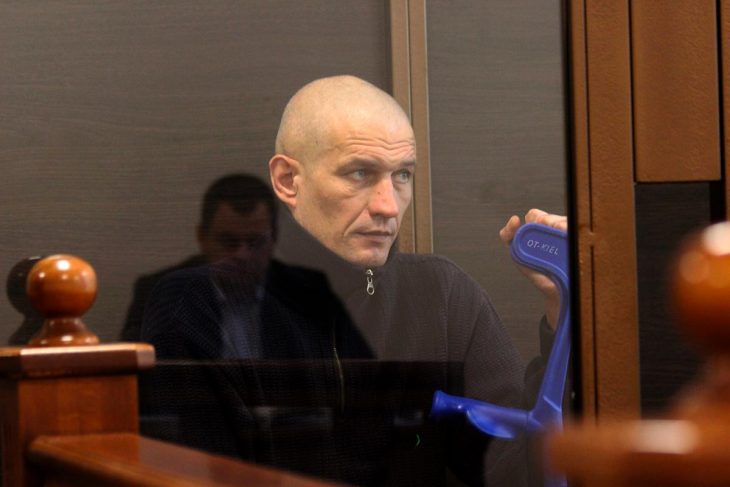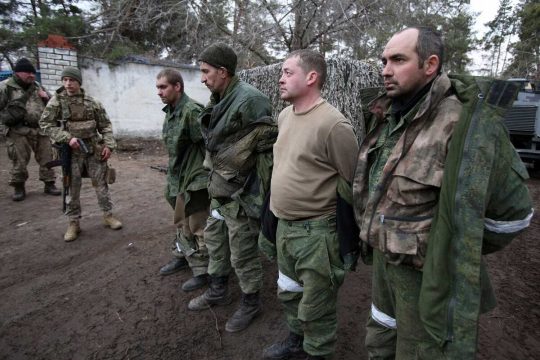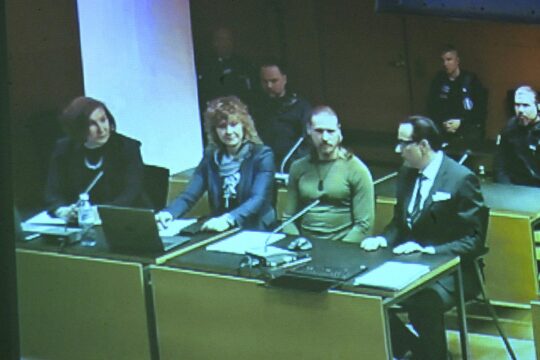On September 8, 2022, the hearing began late. Accompanied by two guards, Ruslan Yelkin was slowly led into the courtroom, then into the glass cage of the accused. The accused moved with the help of crutches, as he has only one leg left. He lost the other one last March, when his unit of fighters from the Donetsk People's Republic (DPR), a region that has self-proclaimed its separation from Ukraine, came under mortar fire from the Ukrainian armed forces. Seriously wounded and then captured, he was tried six months later in a court in Odesa, in the south of the country, for treason and participation in a terrorist organization.
Yelkin is 42 years old. He was born in the village of Roscha, in the Odesa region. In 2000, he moved to Donetsk, Donbass region, where, three years later, he was hired by the internal affairs authorities. Until 2006, he worked as a policeman before resigning. He married twice and has three children, all minors.
According to prosecutor Yehor Timonov, Yelkin joined the ranks of the DPR separatists as early as May 2014 when the armed conflict spread to Donbass. As part of the "1st Slavic Battalion", he allegedly participated in the storming of such towns as Debaltsevo, Vuglegirsk, Svitlodarsk, Khrustalne (formerly Krasny Luch) and the village of Kadiivka (formerly Stakhanov). Then, after the large-scale Russian invasion in February 2022, he reportedly fought as a grenadier in the 11th motorized rifle regiment of the separate DPR People's Militia. For two weeks, he allegedly participated in the assault on several Ukrainian villages in the Donetsk region, committed to "ridding" them of the Ukrainian army. Thus, between February 27 and March 12, Yelkin's regiment captured the villages of Prokhorivka, Kamianske, Sonyachne, Khlibodarivka, Donetske, Vilne, Blizhne, Bugas, Novotroitske, Olenivka and Berezovo. On March 13, his unit moved to the village of Stepove, where it clashed with the Ukrainian army. It was during this battle that he was wounded.
The campaign of February 2022
There are two indictments against Yelkin in the court of Odessa. The first was in absentia, issued in 2018, for participation in a terrorist organization. Yelkin was then subject to a wanted notice. The second indictment was issued after his capture. In it, he was charged with treason, for fighting on the side of the DPR while still holding a Ukrainian passport. The court joined the two cases.
Yelkin confirmed all these circumstances in court and admitted his guilt. The man recounted in chronological order each visit of the occupation forces to Ukrainian villages - rather curtly and without much detail, giving the impression that his unit had not followed a clear plan of action. He described how his command constantly argued, did not explain anything to subordinates, and disturbed them almost every night for inspections and briefings. He also explained that he often changed his route, returning several times to villages already captured.
The main task of Yelkin's division was to "clean" the already occupied residential areas, looking for Ukrainian soldiers who might be hiding in basements. According to the accused, the captured members of the Ukrainian armed forces were not killed, but "only taken prisoner".
Yelkin also does not deny that his unit was sometimes based in civilian infrastructure: in the village of Prokhorivka they occupied the House of Culture and in the village of Vilne, a school.
The fatal assault
Before the assault on March 13, they were given additional weapons - ammunition, grenade launchers and flamethrowers - and ordered to turn off their phones and "keep completely silent." "Around 6:30 a.m. we approached the landing near the village" of Stepove, the defendant recounted. "We stopped to rest, our artillery went into action. We were ordered to enter the village, occupy the first street and maintain the defense there. We rushed in. We went to the first two houses, mortar fire began on our positions. There were “300” [military code for wounded soldier]. Everyone rushed everywhere. We captured four Ukrainians in one of the houses. On our side, there were “300”. The prisoners helped us load the wounded. At the landing stage, where we were earlier, an armored personnel carrier was already waiting for us. We delivered the prisoners and our “300”. Then the order came to return to the house where the armed forces position was. As soon as we returned, the mortar fire began. The commander realized that we had fallen into a trap and the Ukrainian armed forces advanced towards us."
The command ordered a retreat. Yelkin was in the first group of seven fighters to leave the village along the landing stage. During their exit, four mines exploded. "I was wounded in the leg, with a fracture below the knee. A friend's leg was blown off. A third had both legs blown off, they were lying next to his head. A doctor ran to us and gave us a painkiller shot. He put a tourniquet on one of them and tied my leg with an elastic bandage. The shelling resumed. Our people started to move away and we stayed. I hoped they would come back for us. We stayed there all night. The first comrade with torn legs died at 11 o'clock at night. The second was still alive. I passed out and woke up at 6:00 in the morning. I touched the second one, but he was already cold," Yelkin says.
The capture
In the morning, Yelkin was able to call his command and ask to be evacuated. His correspondent first promised to "make something up," then admitted that it would be "problematic" to intervene and advised him to make his own way. "Nearby was a highway with destroyed equipment. I said I could crawl to the destroyed tank so they could take me from there. After that, I passed out again. When I came to my senses, the phone rang in my pocket. The company commander asked me if I was alive, if anyone else had survived, and promised to call back. No one called back, so I called them back. They asked me again if I was not a prisoner and told me to crawl to the tank. At that moment, my phone rang. I half-heartedly crawled over, looked up and saw the drone. At first I thought it was our people looking for me. I crawled 15 meters to the intersection, and there I was taken away by the Ukrainian Armed Forces."
Captured on March 14 near the village of Stepove, Yelkin was sent to the hospital, where his leg was amputated. Then he was taken to Zaporizhzhia where, along with other fighters, it was planned to exchange them for Ukrainian prisoners. But the exchange failed. Yelkin being already wanted for trial, he was taken to Odesa.
Maximum sentence
The prosecutor demanded 15 years imprisonment against Yelkin, with confiscation of property - an 8-hectare plot in the Odesa region, which belongs to the accused. Defense lawyer Olga Bayraktar objected, saying that her client cooperated with the investigation, admitted his guilt and testified honestly in court, so the sentence should be more lenient. "Please note that my client has three minor children. He has no prior convictions. Therefore, I think there is every reason to impose the minimum sentence - 12 years in prison," she said.
After deliberation, Judge Viktor Ivanov found Ruslan Yelkin guilty of treason and participation in a terrorist organization, and sentenced him to 15 years in prison with confiscation of property. It is probably the first case on crimes against national security in Odesa where no war crimes trial has taken place so far. It is not yet known whether Yelkin will soon be part of a prisoner exchange.
This report is part of a series on war crimes, produced in partnership with Ukrainian journalists. A first version of this article was published on the Sudovyi Reporter website.







